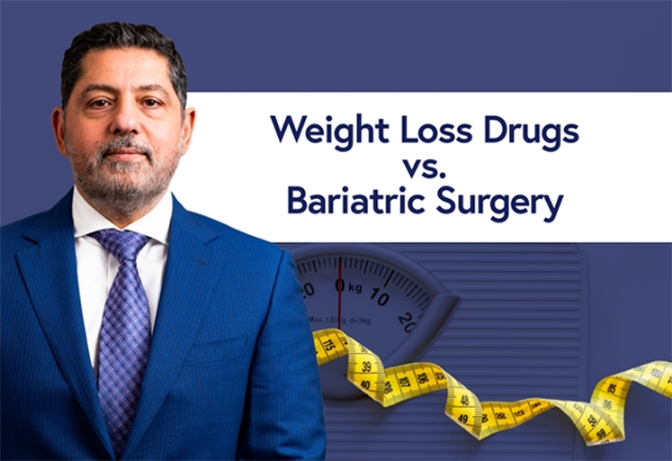Weight Loss Drugs vs. Bariatric Surgery – Which is Right For You?
If you’re trying to lose weight and finding it difficult, you may have considered taking medications or undergoing bariatric surgery. Both of these... read more
Call Us Today (732) 640-5316
E-Waiting RoomLiam Davenport
May 25, 2016
Metabolic surgery, or the use of bariatric surgery with the intent to treat type 2 diabetes and obesity, should be considered as a treatment option even in patients with mild obesity if their blood glucose levels are inadequately controlled, says a group of international experts, who are backed up by diabetes organizations.
In a statement that, for the first time, sets out a series of detailed recommendations on the use of surgery in type 2 diabetes, the experts from across the globe endorse metabolic surgery as an option in patients with a body mass index (BMI) of 30.0 to 34.9 kg/m2 with inadequately controlled hyperglycemia and as a recommended therapy in patients who are even more obese.
Noting that metabolic surgery is “potentially cost-effective” in obese patients with type 2 diabetes, they write: “The clinical community should work together with healthcare regulators to recognize metabolic surgery as an appropriate intervention for type 2 diabetes in people with obesity and to introduce appropriate reimbursement policies.”
Coauthor Philip R Schauer, MD, bariatric surgeon and director of Cleveland Clinic’s Bariatric & Metabolic Center, Ohio, told Medscape Medical News that the guidelines are “historic.”
He said: “I’ve seen lots of guidelines on medical care in my career, for everything from colonoscopy to guidelines on aspirin and all kinds of things, but I’ve never seen guidelines that have been endorsed by 45 medical organizations.”
I’ve seen lots of guidelines on medical care in my career, for everything from colonoscopy to guidelines on aspirin…but I’ve never seen guidelines that have been endorsed by 45 medical organizations.
The statement is published in the June issue of Diabetes Care.
Despite recent growing evidence in its favor, bariatric surgery has been notably absent from treatment algorithms for type 2 diabetes.
Dr Schauer believes that that has hinged on previous interpretations of the robustness of the evidence. However, he said that in the past 2 or 3 years there has been an “accumulation of a number of very robust studies showing very consistently and predictably the effect of surgery on diabetes.”
The guidance also indicates that Roux-en-Y gastric bypass has the most favorable risk/benefit profile “for most patients with type 2 diabetes.”
GI Tract Is “Clinically Meaningful Target” for Treatment of Type 2 Diabetes
To develop a series of recommendations on the benefits and limitations of metabolic surgery, six international diabetes organizations, including the American Diabetes Association (ADA), the International Diabetes Federation (IDF) and Diabetes UK, convened the 2nd Diabetes Surgery Summit (DSS-II).
Ahead of the meeting, the DSS-II organizing committee tasked a multidisciplinary group of 48 international clinicians and/or scholars, of whom 75% were nonsurgeons, to conduct a MEDLINE search for studies published between 2005 and 2015 on the short- and long-term efficacy and safety of bariatric surgery in patients with type 2 diabetes.
A subsequent evidence appraisal was followed by three rounds of Delphi-like questionnaires, which measured the degree of consensus on 32 evidence-based conclusions.
In September 2015, these were then presented at the combined DSS-II and 3rd World Congress on Interventional Therapies for Type 2 Diabetes in London and opened up for discussion and amended face-to-face by the expert committee.
At the time of going to press, as well as the ADA, IDF, and Diabetes UK, the recommendations had also been endorsed by the American Association of Clinical Endocrinologists, the American College of Surgeons, the European Association for the Study of Obesity, the European Association for the Study of Diabetes, and the US Endocrine Society, among others, as well as a range of national societies.
The final statement recommends that people who develop type 2 diabetes “should have access to all effective treatment options” and, given its role in metabolic regulation, the gastrointestinal tract is “a clinically and biologically meaningful target for the management of type 2 diabetes.”
Surgery an Option Even for BMI of 30 and Above
It goes to on state that there is “a substantial body of evidence” largely from short- and mid-term studies showing that metabolic surgery “can achieve excellent control of hyperglycemia and reduce cardiovascular risk factors.”
It acknowledges, however, that further studies are required to demonstrate long-term benefits of surgery.
Nevertheless, the experts agreed that metabolic surgery should be “a recommended option” to treat surgically suitable patients with class 3 obesity, defined as a BMI ≥40 kg/m2, “regardless of the level of glycemic control or complexity of glucose-lowering regimens.”
Dr Schauer emphasized that surgery “should play a more prominent role” in class 3 obesity, as “diabetes is so difficult to manage” in these patients and it is often accompanied by comorbidities such as sleep apnea, hypertension, dyslipidemia, fatty liver disease, and arthritic problems.
He added: “Class 3 obesity is very likely to respond well to surgery, and it’s not likely to respond well to anything else, in terms of medical therapy or even diet and exercise–type programs.”
The statement also recommends metabolic surgery in patients with class 2 obesity (BMI 35.0–39.9 kg/m2) who have inadequately controlled hyperglycemia, despite lifestyle and optimal medication therapy.
Dr Schauer also noted that, “for the first time ever,” the guidelines “have a place for surgery in patients with class 1 obesity.”
Specifically, the statement says that surgery should “be considered” as an option in class 1 obesity (BMI 30.0–34.9 kg/m2) among patients who have inadequately controlled hyperglycemia despite optimal medical treatment by either oral or injectable medications, including insulin.
In all cases, the BMI values should be reduced by 2.5 kg/m2 in patients of Asian descent, the statement says.
Bariatric Procedures Should Be Performed in High-Volume Centers
Another aspect that the guidelines emphasize is the need for multidisciplinary care in the provision of metabolic surgery and for the procedure to be performed in high-volume centers.
Dr Schauer observed that multidisciplinary care is common for type 2 diabetes patients, as they will often be being seen by an ophthalmologist, a cardiologist, and a psychologist or psychiatrist, alongside their primary medical doctor.
The multidisciplinary approach extends to those who need surgery at a bariatric center. “Patients who are going to be considered for surgery have to be evaluated by a psychologist, dietician, a medical doctor, and a surgeon and then followed long-term as well,” he explained.
“Ongoing and long-term monitoring of micronutrient status, nutritional supplementation, and support must be provided to patients after surgery according to guidelines for postoperative management of bariatric surgery,” the statement indicates.
Roux-en-Y Gastric Bypass Best for Most Type 2 Diabetes Patients
And with regard to the different types of bariatric procedures available, the experts give these verdicts.
For Roux-en-Y gastric bypass (RYGB), they say, “among the four accepted operations for metabolic surgery, it appears to have a more favorable risk/benefit profile in most patients with type 2 diabetes.”
For vertical-sleeve gastrectomy, they note that “longer-term studies” are needed, but current data suggest it is an effective procedure that results in excellent weight loss and major improvement of type 2 diabetes, at least in the short to medium term (1–3 years) in which outcomes have been measured in randomized controlled trials. “It could be a valuable operation to treat diabetes, especially in patients where concerns exist about the risk of operations that involve bowel diversion [such as gastric bypass].”
Laparoscopic adjustable gastric banding (LAGB) is “effective in improving glycemia” in patients with obesity and type 2 diabetes, but the procedure “is associated with greater risk for reoperation/revision compared with RYGB, due to failure or band-related complications (eg, slippage, erosion, etc).”
And finally, “although clinical evidence suggests biliopancreatic diversion may be the most effective procedure in terms of glycemic control and weight loss, the operation is associated with significant risk of nutritional deficiencies, making its risk/benefit profile less favorable than that of the other bariatric procedures for most patients.” This procedure “should be considered only in patients with extreme levels of obesity (eg, BMI >60 kg/m2),” it concludes.
The DSS-II and 3rd World Congress on Interventional Therapies for Type 2 Diabetes 2015 were supported by the International Diabetes Surgery Task Force (a nonprofit organization), King’s College London, King’s College Hospital, Johnson & Johnson, Medtronic, Novo Nordisk, Fractyl, DIAMOND MetaCure, Gore, MedImmune, and NGM Biopharmaceuticals. None of the DSS-II codirectors, members of the organizing committee, or voting delegates received payment for their efforts. No other relevant financial relationships pertaining to this article were reported.
Diabetes Care. 2016;39:861-877. Article

Dr. Ragui Sadek is a premier surgeon who established a state-of-the-art and one of the safest bariatric surgery programs in the state. Dr. Sadek has fellowship training in both laparoscopic/bariatric surgery and surgical trauma/critical care, allowing him to safely perform complex surgeries on patients who have been turned down by other practices. As a Clinical Assistant Professor of surgery at RWJ Medical School & the Director of bariatric surgery program at RWJ University Hospital, Dr. Sadek offers a cutting-edge range of laparoscopic, robotic, & bariatric surgical procedures with a complication rate substantially below the national average.
Dr. Sadek is a Clinical Assistant Professor of Surgery at Rutgers-Robert Wood Johnson Medical School and a Fellow of the American College of Surgeons. Having performed more than three thousand advanced surgical procedures, Dr. Sadek has established a strong patient satisfaction rate and a solid reputation among the surgical community and is renowned as a top physician in his field by International Association of Healthcare Professionals. As a board-certified surgeon, he holds affiliations with the American Society of Metabolic and Bariatric Surgery and the Society of American Gastro Endoscopic Surgeons. More about Dr. Sadek
Stay current with Advanced Surgical & Bariatrics of New Jersey

If you’re trying to lose weight and finding it difficult, you may have considered taking medications or undergoing bariatric surgery. Both of these... read more

Are you frustrated with your inability to lose weight? Tired of being trapped in an endless cycle of yo-yo dieting, over-exercising, cleanses, and... read more